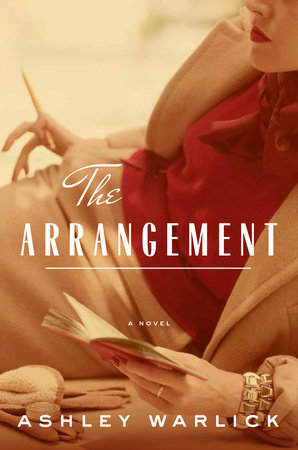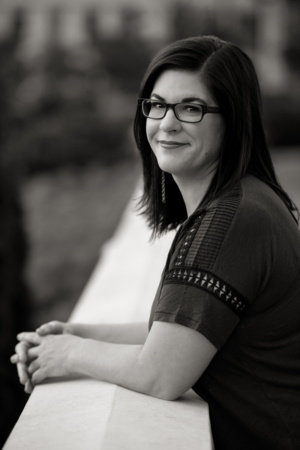- Categories:
Bookseller Ashley Warlick Hits the February Indie Next List With Novel About M.F.K. Fisher
- By Liz Button
Ashley Warlick, a novelist, food magazine editor, and co-founder and buyer at M. Judson Booksellers & Storytellers in Greenville, South Carolina, was honored when her novel The Arrangement (Viking, February 9), an exploration of pioneering food essayist and all-around passionate woman M.F.K. Fisher, was selected by her fellow booksellers for the February 2016 Indie Next List.
 The Arrangement is set in California, France, and Switzerland in the 1930s, when Fisher, born Mary Frances Kennedy in 1908 in Albion, Michigan, was honing her skills as one of the first food essayists. As Fisher, whose work paved the way for the likes of Ruth Reichl and Laurie Colwin, grows in literary renown, her marriage to the writer Al Fisher crumbles and she boldly takes her husband’s best friend, the author and painter Dillwyn “Tim” Parrish, as her lover. Parrish becomes Fisher’s first writing mentor, her second husband, and, later, her muse.
The Arrangement is set in California, France, and Switzerland in the 1930s, when Fisher, born Mary Frances Kennedy in 1908 in Albion, Michigan, was honing her skills as one of the first food essayists. As Fisher, whose work paved the way for the likes of Ruth Reichl and Laurie Colwin, grows in literary renown, her marriage to the writer Al Fisher crumbles and she boldly takes her husband’s best friend, the author and painter Dillwyn “Tim” Parrish, as her lover. Parrish becomes Fisher’s first writing mentor, her second husband, and, later, her muse.
William Carl, a manager at Wellesley Books in Wellesley, Massachusetts, called The Arrangement “a sensual novel in every sense of the word. The reader experiences all the excitement of both food and sexuality as Fisher becomes a more independent woman and discovers her writing abilities.”
This past July, Warlick opened M. Judson with co-owners Samantha Wallace, publisher of Southern food magazine edibleUpcountry, which Warlick edits; Tricia Lightweis, founder and former owner of The Booksmith in Seneca, South Carolina; and local entrepreneur June Wilcox. Since then, Warlick said, the town has wholeheartedly embraced the store, which features a restaurant and a carefully curated book selection focusing on food, the South, and children’s books.
 As a writer with a background as a cook and a lover of food and books, Warlick said becoming a bookseller has given her yet another perspective on the worlds of writing and publishing.
As a writer with a background as a cook and a lover of food and books, Warlick said becoming a bookseller has given her yet another perspective on the worlds of writing and publishing.
“One of the cool things about being a bookseller is that I learned The Arrangement was going to be on the Indie Next List a while ago!” said Warlick, who also teaches fiction in the MFA program at Queens University in Charlotte, South Carolina. “I think I’ve also learned a lot about what that really means. I know that, as a book buyer, if I see a book is on the Indie Next List, I am definitely going to look into getting it for my shop, and I’m definitely more likely to pick it up and read it.”
Warlick said food has always been important to her, and after growing up in a family of eaters where no one was really a cook, she later taught herself how. Her love of cooking and food, and of writing about it, has only grown with the years.
“I think all of my novels have had some extravagant meals, but this is the first time I have dealt with it so directly,” said Warlick, whose other books are The Summer After June, The Distance From the Heart of Things, and Seek the Living (all Houghton Mifflin Harcourt).
Warlick, who described M.F.K. Fisher as a “magnificent essayist and structuralist,” said she became a great fan of Fisher’s after reading some of her essays during college. Fisher, once praised by her contemporary W.H. Auden as “the best prose writer in America,” fused memory, recipe, description, and emotional impression in food writing classics such as Serve it Forth (1937), Consider the Oyster (1941), How to Cook a Wolf (1942), and The Gastronomical Me (1943).
In her research for The Arrangement, Warlick read everything published by and about Fisher, from biographies to Fisher’s own numerous books, essays, and collected letters.
Warlick said she eventually found that Fisher seemed to have left a lot out of her personal essays and that some of the events in her books and in her personal letters do not match up. She also found that Fisher had a number of primary sources destroyed before her death in 1992. As a result, much of the pleasure Warlick found in the 10-year process of writing and rewriting The Arrangement was in the act of discovery.
Her creative goal was filling in the emotional blanks; to inhabit Fisher’s inner thoughts by imagining “what would have brought her from point A to point B...There is a timeline, a map — I know where she was when she was there, but any of her honest emotional record has been lost with her.”
As it turns out, Warlick said, circumstances that could have been a barrier allowed her to experience one of her great joys as a writer and as a person: parsing human motives, thought processes, and interior lives. She was able to explore, she said, “the way that a conversation is never just what is being said.”

